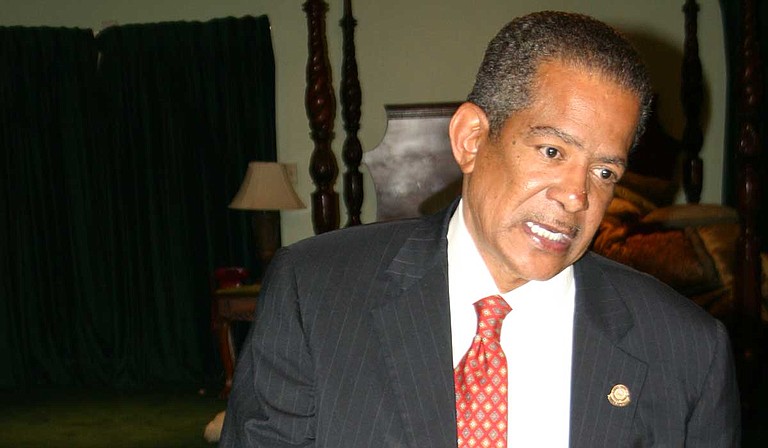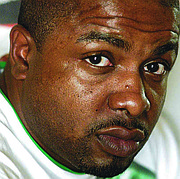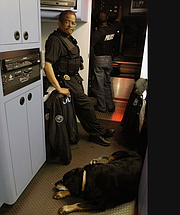A high point of Donna Ladd’s investigations of Frank Melton came when then-DA Faye Peterson ordered the young men out of his home after years of leaders and judges allowing him to bring them into a gun- and alcohol-soaked home. Photo courtesy WPB
Wednesday, July 10, 2019
What a couple of weeks: I lost a good friend and colleague in Cedric Willis; I had check and credit-card fraud hit inside my office and staff; and I've just spent recent days feeling punched in the gut as news crept out first about Jeffrey Epstein finally being arrested properly for trafficking children and then his safe full of sick, naked souvenirs. As someone who was raped as a teenager, this news is devastating.
It's not an easy time in journalism by any measure. My 2018 team may have just won 20 southeastern U.S. awards for deep and impactful work we did last year, but the reality in our industry overall is that we have to scrap and claw to keep staff and ourselves paid and doing the top-notch work our community needs and expects from us coming out. It's the same for most outlets in the U.S., especially those of us who don't pander or violate journalistic ethics by trading a story for ad dollars or avoiding vital stories that their funders don't want. Journalism is under attack, both politically and from Internet giants like Facebook.
I've experienced several journalism low-blows in recent months. I had to let someone go for multiple instances of plagiarism I caught before print. I've had work product stolen. Oh, and the Dem men attacks about me both being "miserable"—they don't know my Zen self—and on the payroll of the Mississippi GOP (why they block me on Twitter?) after I criticized a Democratic pol for voting for the Heartbeat bill. It seems that I also think Ronald Reagan fixed the economy—an easily factchecked lie.
Joke's on them—journalism is often a thankless profession, and a progressive woman newspaper editor in the middle of Mississippi knows that better than anybody, I'd wager. My response to efforts to derail me and my paper is always the same: "Excellent work is the best response. Back to it." And forward this news train chugs.
The good news among all the real loss of late is a boost to my faith in truly good journalism to survive all attackers. I'm reminded of the phrase my partner Todd Stauffer embraced in the early months of the JFP back when we unpacked Trent Lott's (and the Mississippi GOP's) racist political strategies in 2002 and then came out against the Iraq War the week it started when it could have been business suicide.
"Do the right thing and wait" became his mantra to help him sleep at night.
Deepest Midnight: Cedric Willis and The Failure of Mississippi Justice
Jackson police took Cedric Willis from his home when he was 19 in 1994 with him promising his family he'd be "right back." But a broken Hinds County prosecution system and bad policing conspired against him, and he did not gain his freedom for 12 years, spending much of it in horrendous conditions in Parchman prison.
This recent boost came, first, from thinking so much about Brian Johnson's 2006 story about Cedric that the new exoneree used to lobby the Legislature for better restitution laws. (He picked up our extra copies to hand out.) And I didn't know until his funeral that he had the issue's cover reproduced on a T-shirt that he then wore to vote for Barack Obama in 2008. I do know just how many young journalists and soon-to-be voters were inspired by his story and his visits. I also know Brian was the only journalist who told the full story about Hinds DA Ed Peters' office and the State of Mississippi basically covering up Cedric's innocence while they were making a big deal out of finally putting Medgar Evers' killer in prison—a case that led to prosecutor Bobby DeLaughter and a reporter being canonized in a white-hero movie about the overdue prosecution, even as Cedric Willis was being brutalized in Parchman with no media giving a damn until attorney Emily Maw and the Innocence Project New Orleans came along years later.
That, in turn, got me to thinking about the journalism Brian, Adam Lynch and I did about Frank Melton's mayoral campaign and term as mayor. Melton was a destructive character boosted by a press corps that mostly loved him. (I'm told some feared him). That work really put us on the local and national map—and had deep community impact. Our investigations led to fraught state and federal trials for him that ended in acquittals or mistrials, but importantly kept the spotlight (other media joined belatedly) on him and his gun-toting, alcohol-fueled cries for attention.
My Melton era resulted in what I consider the most vital result of my own journalism—then-DA Faye Peterson ordered the boys, whom he had also used to try to discredit her, out of his home. There, I had seen the mayor staggering drunk and strapped with guns, putting teens on show like they were his trophies. It was sick and creepy. While I couldn't definitely prove the worst rumors about him true or not—his young accusers had been murdered—knowing his "foster-parent" con was up helped me sleep at night.
The Melton experience would motivate me to study evidence-based violence prevention (it's not boys with sledgehammers). That later led me to profile former gangster Benny Ivey for The Guardian and then the Jackson Free Press, which ended up with him as one of Mississippi's first two credible messengers. Now that's a journalism trail.
On the Road Again with Frank Melton
Donna Ladd's adventures on Frank Melton's big RV • Photo by Kate Medley
I've thought about Melton a lot since the Epstein arrest resulting from the stellar journalism of Julie K. Brown at the Miami Herald, who wouldn't let go of an aging injustice. I've experienced what she must have gone through doing this work—fear, public disparagement, late and sleepless nights, calls at all hours, worry about protecting victims, getting the facts right. And in my case, if Melton or others would succeed in running me out of business as promised, thus lowering the journalism bar back to 2002 levels when star reporters couldn't figure out how to report both sides of "tort reform."
When you get into this crazy business for the express purpose of having positive impact, you make it happen no matter what and find people who share the same drive to help you. Awards and accolades are secondary, although they feel great after the hell you go through. Insults and absurd lies end up not mattering a hill of beans. The progress you and your teammates all ignite together with stellar reporting, while cheering each other on, is what is exciting and necessary about long days, multiple drafts, factchecking, the threats and lies.
Journalism can and will beat the hell out of you, these days more than ever. But then you go to a friend's funeral overwhelmed with grief and see his picture on the big screen wearing your newspaper's cover on his T-shirt when he voted for the first time, and only one thought remains.
The journalism must go on.
Attend a crime town hall in honor of Cedric at Walton Elementary School on Aug. 1 from 6 to 8 p.m. See http://jxnpulse.com/2019/07/ymps-youth-crime-violence-town-hall-dialogues/. Please support the JFP's deep, impactful journalism by joining the JFP VIP Club at whatever level you can afford.




Comments
Use the comment form below to begin a discussion about this content.
Sign in to comment
Or login with:
OpenID